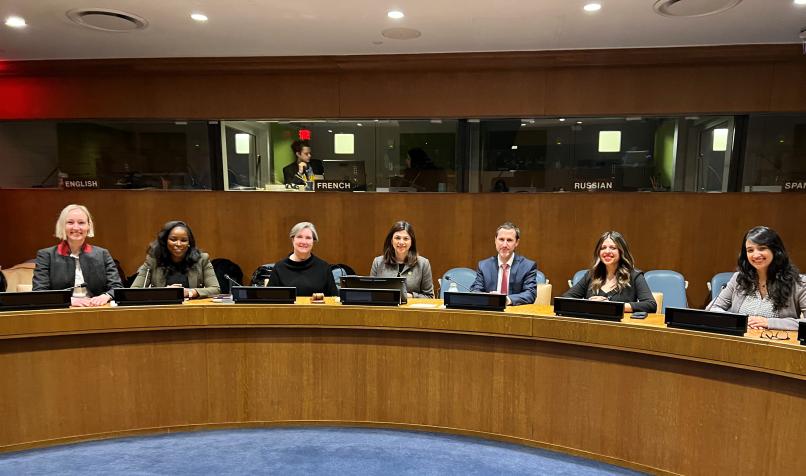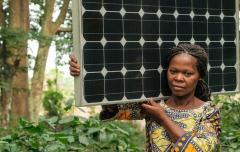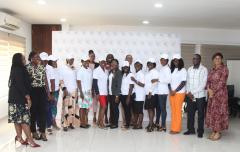Powering gender equity: Women entrepreneurs at the forefront of sustainable energy transition
In the framework of the sixty-seventh session of the Commission on the Status of Women, the United Nations Industrial Development Organization (UNIDO), together with ENERGIA International Network on Gender and Sustainable Energy, the Global Women’s Network for the Energy Transition (GWNET), and Sustainable Energy for All (SEforAll), co-hosted a side event entitled “Sustainable energy innovation - Powering gender equity”.
This side-event was organized by the multi-stakeholder coalition that coordinates the Gender and Energy Compact, developed in the framework of the UN High Level Dialogue on Energy. This Compact places women and gender equality at the centre of the achievement of Sustainable Development Goal 7 (SDG7): ensuring access to affordable, reliable, sustainable and modern energy for all.
Data is loud and clear - women’s participation in the energy sector continues to remain starkly low. And the gender gap in the energy sector remains as wide as ever.
Women's participation in the energy sector can differ considerably across various subsectors, but it remains notably lower than the global average of 48 percent across all industries. Women represent only 22 percent of the workforce in the oil and gas sector and 32 percent in the renewable energy sector (IEA, 2020)[1]. This disparity becomes even more prominent at the executive level, where women typically constitute less than 20 percent of board members.
The Gender and Energy Compact is a critical coalition in advancing gender equality in a just energy transition, and in reducing the gender gap.
The core outcomes of the compact consist of action areas to reduce the energy poverty and drudgery of women by increasing women’s access to and control over sustainable energy products and services. The compact also encourages countries and regions to reformulate and adopt more inclusive and gender-responsive energy access and transition pathways, focusing on creating entrepreneurship opportunities and access for women led businesses. Finally, it calls for the tools, knowledge, and gender-disaggregated data to measure progress, raise awareness, and create an evidence base.
Recognizing the need for urgent action, prominent speakers emphasized the importance of empowering women in clean energy, to promote gender equity.
Ralf Bredel, Director & Representative of UNIDO to the United Nations in New York, highlighted the need to mainstream gender across energy and climate change portfolios, and emphasized that gender-transformative initiatives are particularly needed to tackle inequalities in the sustainable energy sector.
“In fact, we need a dual track approach to enhancing gender equality and women’s empowerment. On the one hand, we need to mainstream gender across existing energy and climate action portfolios. On the other hand, targeted initiatives are needed to close the gender gap.”
Ralf Bredel, Director & Representative of UNIDO
The emphasis on advancing gender equality in energy and the recognition that partnerships and joint action are important is also what led UNIDO to initiate the Gender and Energy Compact, a coalition that aims to capture countries' and organizations' specific commitments between now and 2030 for advancing gender equality and women’s empowerment in the energy sector.
Anna Pála Sverrisdóttir, Counsellor at the Ministry for Foreign Affairs of Iceland, underscored the necessity for advancing gender equality through systematic approaches. She mentioned that the government of Iceland is committed to fighting overarching stereotypes and is continuing the ground work through the ‘National energy compact of Iceland’ and with various programmes specifically focused on increasing participation of women in the energy sector, expanding networking, mentorship and education opportunities.
“Gender Equality is not only smart economics and the right thing to do, but also a human right.”
Anna Pála Sverrisdóttir, Counsellor at the Ministry for Foreign Affairs of Iceland
Anita Otubu, Senior Director at the Universal Energy Facility, SEforALL, identified cultural, social, and financial issues as the root of gender inequality. She shared that results-based financing could help female-led businesses access capital and highlighted the Women and Youth at the Forefront programme at SEforALL that aims to expand professional and leadership opportunities for women in the energy workforce and supports and champions the next generation of female energy leaders.
“Gender inequality stems from 3 issues; cultural, social, financial - women are expected to be at home, and be mothers, wives. The gender gap is huge, there are more males in the industry and female led businesses are still intimidated. Results based financing at SEforALL provides, and grants subsidies - and covers 60% of the capital expenditure, which makes it more likely to invest in female led businesses.”
Anita Otubu, Senior Director at the Universal Energy Facility, SEforALL
She further mentioned that female-led businesses lack access to capital and have to rely on family loans and their own savings, as well as being forced to speed up operations to attract investments from teams that are made up of men. This makes it unlikely to raise necessary finance for women.
Shazia Khan, CEO of EcoEnergy, mentioned how women-led businesses receive less than 2 percent of all venture capital funding worldwide, despite running 38 percent of businesses (Bahn et al., 2020). This further highlights the disparities and challenges that women entrepreneurs face in the energy sector. She proposed investing grant money for climate and energy in female-led businesses and providing more business training for women through incubator and accelerator programs. Eduarda Oliveira Zoghbi, Senior Advisor at Student Energy, pointed out the lack of access to STEM education, leadership, mentorship, and networks as contributing factors to gender inequality in the energy sector.
Katherine Lucey, Founder and CEO of Solar Sister, emphasized the importance of local women entrepreneurs, who became "solar sisters" in delivering clean energy access to their communities. By meeting women where they are and providing peer support, she believes that it is possible to overcome systemic barriers and enable women to become leaders and innovators in the sustainable energy sector.
“Women have what it takes to get there. Women do a lot, with very little.”
Katherine Lucey, Founder and CEO, Solar Sister
Kanika Chawla, Director and Chief of Staff at SEforALL, stressed that gender equality is more than access to energy – it encompasses women's participation in the workforce, access to capital, and includes issues like violence against women.
In conclusion, Chawla emphasized the relevance of the Gender and Energy Compact, which aims to amplify voices and create a global community for gender equity in energy. She called on stakeholders to join the compact to work together to provide practical solutions, overcome challenges and to “create the future that we need.”
The signatories of the Gender and Energy Compact are committed to supporting and accelerating action towards a just, inclusive and gender-equal energy transition. Among the compact's undersigning parties are the governments of Canada, the Dominican Republic, Ecuador, Iceland, Kenya, Nepal, Nigeria, Norway and Sweden, as well as USAID/Power Africa and more than 75 public and private sector entities. The compact builds on the conviction that we need to come together as diverse actors to achieve meaningful change and overcome the greatest challenges of our time, including the climate crisis and gender inequalities.
Net-zero targets and SDG7 can only be achieved with the meaningful and equitable inclusion of women as energy users, producers, innovators, and decision-makers.
The recording of the event can be accessed here: Sustainable energy innovation - Powering gender equity (CSW67 Side Event) | UN Web TV
[1] IEA (2020), 'Gender diversity in the energy sector: Agents of change', International Energy Agency, Paris. [https://www.iea.org/commentaries/gender-diversity-in-the-energy-sector-agents-of-change]


